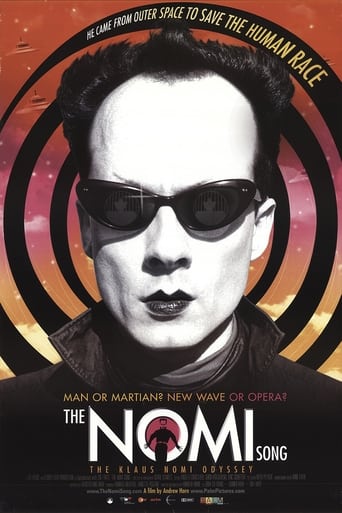Perry Kate
Very very predictable, including the post credit scene !!!
Flyerplesys
Perfectly adorable
BroadcastChic
Excellent, a Must See
ChanFamous
I wanted to like it more than I actually did... But much of the humor totally escaped me and I walked out only mildly impressed.
MartinHafer
Before I saw this documentary, I'd never heard of Klaus Nomi--even though I lived through the time period in which he gained underground fame in New York and abroad. What I remember instead are the New Wave acts that followed in his footsteps--groups that imitated his weird stage routine, makeup and costumes. Probably the closest to Nomi that I remember was Grace Jones, though the hair and costumes of A Flock of Seagulls also had to have been influenced by Nomi as well. As for David Bowie, it's hard to tell how much Nomi influenced him or vice-versa as both had a rather similar "other-worldliness" about them in the 1970s.What completely set this man apart, including from the people listed above, was his bizarre singing. Having had aspirations to do opera and having a very, very high-pitched voice (almost like one of the castrati), his singing was something unmatched then or today. Some of this could be because few could imitate the style and some because it was so strange and outside the mainstream you wonder if there'd even be a market for this sort of music. It was interesting and wild--though, to me, not especially something I would like to listen to for long.This documentary is about his life--particularly after he came to America in the early 70s. His life in Greenwich Village among the artsy crowd, his rise to prominence in what was to be termed the "New Wave" and his ultimate fall when he just started to achieve fame are all chronicled here. A sad piece, but I also appreciated how the film makers didn't just whitewash the man--giving a hint to the darker aspects of this strange man (such as the repeated theft of his friend's music).How the story was told was done well, though there were limits since the video recordings of Nomi were often of poor quality due to the technology of the time. Also, in a VERY strange move, old audio interviews with his aunt were used but in an odd way. Since they had no video, they created sets and used a large cut-out of her! Weird, but considering Nomi's legacy, probably appropriate.Considering that I didn't know about Nomi and was not so taken by his music, you'd expect I wouldn't really care for the film, but this would be mistaken. It was nice from a nostalgic point of view for this 40-something guy and the film was well-constructed. Well worth a look if you like documentaries AND want something different....VERY different.
aliasanythingyouwant
Andrew Horn's The Nomi Song makes no bones about it - performance artist Klaus Nomi was a man of genius. The film is an unapologetic celebration of the mystique of Nomi, the weird brilliance of this late '70s/early '80s New York club phenomenon, who had a minor breakthrough after appearing with David Bowie on Saturday Night Live (he sold well in Europe anyway). If you have no idea who Nomi was then you're not alone; his appeal was purely a cultish one. Those who sing his praises in The Nomi Song - people who were doing lots of drugs in the days they're recounting, it must be pointed out - would have us believe that this was a man of such soaring talent, it would only have been a matter of time before he became famous world-wide. The evidence put forth by Horn - old home videos, some snippets from professionally made programs - would seem to suggest something else, however: a man who, in spite of his obvious talent (he was a trained opera singer, a tenor capable of achieving a haunting falsetto), was always too wrapped up in his own strange, stylized persona to ever really connect with the masses.The Nomi Song is the portrait of a man who reinvented himself, an exhibitionist who discovered an audience by nullifying every hint of his own personality, and presenting himself as a kind of performing robot. The real Klaus Nomi, we're told, was a sweet, gentle soul, a kid from Berlin who came to New York with dreams of being a star and wound up mopping floors; and the few glimpses we get of Nomi off-stage would seem to uphold this. The real Nomi, it appears, was nothing special, outside of the fact that he could sing (it was his misfortune that there wasn't much market for German tenors who could stretch to a falsetto soprano); the fake Klaus, invented by Klaus as a replacement for the one the world didn't much care for, was a man with a painted face who dressed like a gay Ming the Merciless and sang opera-tinged pop songs in New Wave clubs. People who witnessed Nomi's bizarre, Kabuki-like stage-act gush on and on about what an overwhelming experience it was, but what we see of Nomi, though certainly odd and interesting, fails to convey this feeling. Nothing, we're led to believe, could ever capture the true power of Nomi on-stage. What the film offers us is a tantalizing taste of something eyewitnesses swear was practically transcendent; it's like trying to appreciate the greatness of Robert Johnson by listening to some scratchy old records.Maybe Nomi was what the film insists he was - a great talent who, by the sad fact of his untimely demise not to mention some egregious mis-management, failed to achieve the stature he seemed destined for. I would tend to doubt it, but the movie makes its argument compellingly, and by placing Nomi in the context of his times, the fag-end of the Andy Warhol days and the beginning of the AIDS horror (Nomi died of the disease), conveys a poignant sense of a lost era, a fondly-remembered scene (the eyewitnesses are all middle-aged, conservative-seeming people; it's hard to imagine them decked out in pink hair and Star Trek get-ups). It finally doesn't matter if Nomi really was what The Nomi Song wants us to think he was (his music was simple-minded and mannered); it matters more that he existed, and embodies in people's minds a certain time and place (those who die young always come to represent the age they lived in; James Dean IS the '50s). The Nomi Song is as much a portrait of the world around Nomi as it is of Nomi, and that world, its strangeness, its lingering energy, is the thing worth remembering.
Dorian Tenore-Bartilucci (dtb)
My husband and I were eagerly anticipating THE NOMI SONG, Andrew Horn's by-turns witty and poignant documentary about Klaus Nomi, the German singer/performance artist with the multi-octave range who took New York and then the world by storm for a brief, exciting period in the 1980s. Nomi, with his outer space alien persona, was so avant-garde even the avant-garde set wasn't quite sure what to make of him, but loved him all the same before his tragic death from AIDS (this was back when AIDS was still new and scary and known as "gay cancer"). Our 8-year-old daughter liked Nomi's "high, high voice" and kooky costumes. We adults liked the interviews with Ann Magnuson and other scene-makers from the era, as well as the chance to see such rarities as Nomi's performance with David Bowie on a 1979 SNL episode (which I remember seeing during its live broadcast back in the day). THE NOMI SONG also sports a treasure trove of DVD extras, including full-length musical performances, an Easter Egg feature for part-time pastry chef Nomi's lime tart recipe, and Lou Christie talking enthusiastically about Nomi's cover of his classic "Lightning Strikes Again" (Christie kinda starts talking about himself, too, but it's interesting and endearing). If you like 1980s New Wave music and all things offbeat, THE NOMI SONG is well worth seeking out!
actorman_us
Klaus Nomi was certainly an interesting character. Possessing a unique look and a phenomenal voice, he seemed poised for a measure of stardom during the early 1980s. Alas, Nomi was to be one of the first people of note to be struck down by AIDS.This documentary does a very credible job of not only giving us a glimpse into Klaus Nomi, but also giving us a look into the world of the "New Wave" in New York during the late 1970s and early 1980s. It is replete with footage of Nomi in performance, showing off his truly bizarre look and his unbelievable singing voice (Nomi's performance of "The Cold Song," an arrangement of a piece by Henry Purcell, is one of the most beautifully haunting pieces of music I've ever heard).Andrew Horn does a very good job of interspersing interview footage and performance footage. He does, however, misstep in a couple of areas. The use of 1950s Sci-fi footage, used to augment Nomi's ruse of being from outer space, is overdone. Horn apparently feels the need to hammer this motif into the ground. More unusual is the use of paper mache cut-outs used to represent Nomi's aunt, seen as we hear her many comments throughout the film. It is a device as obscure in its intent as it is distracting and annoying in its effect.Overall, this is a good documentary with a pervasive sadness. We lost an amazing voice before it could be heard by the world. It is a well done portrait of a unique character, a colossal talent, and at heart, a lonely man with a sweet, sweet soul.

